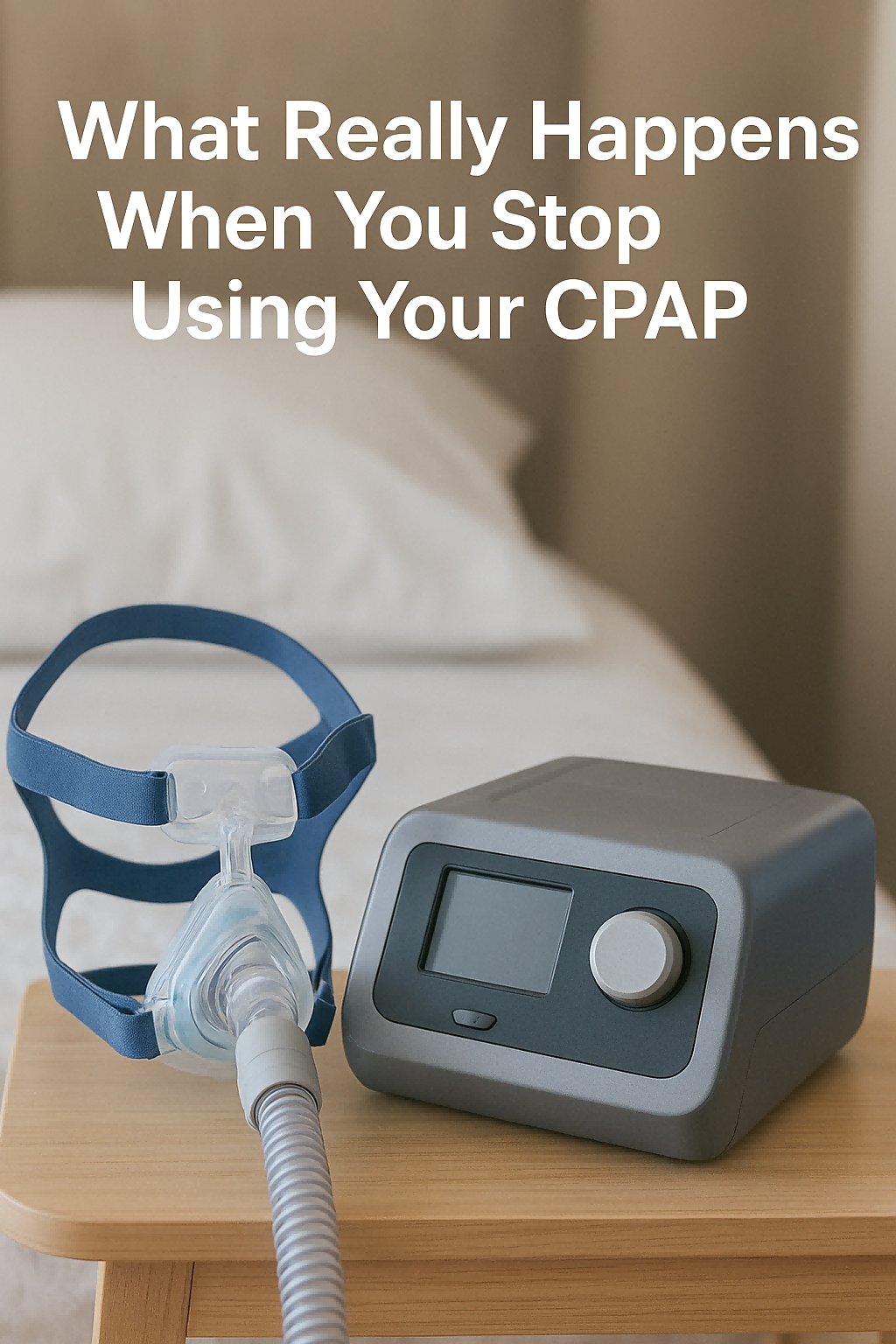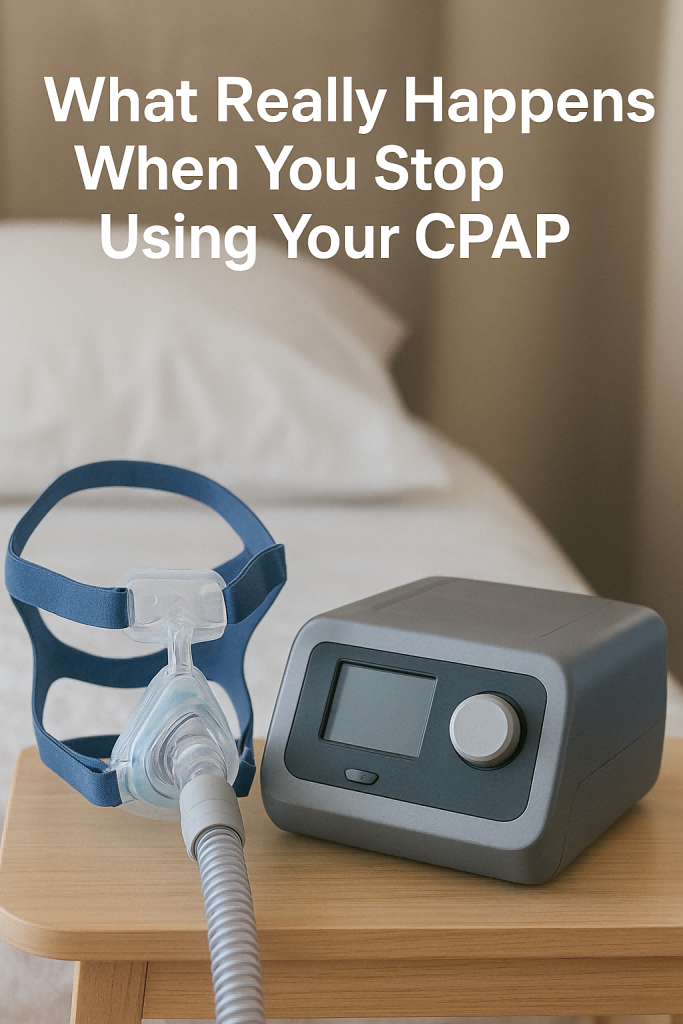What Really Happens When You Stop Using Your CPAP: Shocking Truths Revealed


Sleep apnea isn’t just about loud snoring—it’s a serious medical condition that affects millions worldwide. The Continuous Positive Airway Pressure (CPAP) machine is the gold standard treatment, helping people breathe freely at night. But what happens if you stop using your CPAP? The answer might shock you. From restless nights to life-threatening complications, quitting CPAP therapy can undo the progress you’ve made and put your health at risk.
Understanding CPAP and Sleep Apnea
What Is CPAP and How Does It Work?
A CPAP machine delivers a steady stream of pressurized air through a mask, keeping your airways open while you sleep. For people with Obstructive Sleep Apnea (OSA), this is a game-changer because it prevents dangerous pauses in breathing.
The Role of CPAP in Managing Sleep Apnea
Sleep apnea causes frequent interruptions in breathing, often leading to fragmented sleep, oxygen deprivation, and extreme fatigue. CPAP ensures continuous airflow, reducing apnea events and improving oxygen levels.
Benefits of Using CPAP Regularly
- Better sleep quality
- Reduced daytime fatigue
- Lower risk of heart disease and stroke
- Improved mood and concentration
- Longer life expectancy
What Happens If You Stop Using CPAP Suddenly?
Immediate Effects on Breathing During Sleep
The first thing you’ll notice is the return of loud snoring, gasping, or choking during sleep. Without CPAP, your airway collapses again, causing repeated breathing interruptions.
Impact on Sleep Quality and Fatigue
Within days, poor sleep quality resurfaces. You’ll likely wake up feeling groggy, experience brain fog, and struggle with daily tasks.
Cardiovascular Risks and Blood Pressure Issues
Studies show that skipping CPAP even for a few nights can raise blood pressure and strain the heart. For people with hypertension, this can be particularly dangerous.
Long-Term Consequences of Stopping CPAP
Increased Risk of Heart Disease and Stroke
Over time, untreated sleep apnea drastically increases the chances of heart attack, irregular heartbeat, and stroke.
Cognitive Decline and Memory Problems
Oxygen deprivation damages brain cells. Patients who quit CPAP often report memory lapses, poor focus, and slower mental processing.
Emotional and Mental Health Challenges
Depression, anxiety, and mood swings are common when sleep apnea is unmanaged. Poor sleep worsens mental health, creating a vicious cycle.
Reduced Life Expectancy
Simply put—untreated sleep apnea shortens lifespan. Research suggests that consistent CPAP use can literally add years to your life.
Myths and Misconceptions About Quitting CPAP
“I Feel Fine Without It” – The Hidden Dangers
Some people believe they don’t need CPAP anymore. But sleep apnea is often silent—you may not notice the damage it’s causing until it’s too late.
“I Only Need It Sometimes” – Why Inconsistency Hurts
Even skipping CPAP occasionally can undo its benefits. Sleep apnea doesn’t take nights off, and neither should your treatment.
Alternatives to CPAP Therapy
Lifestyle Changes and Weight Management
Losing weight, exercising, and avoiding alcohol before bedtime can reduce sleep apnea symptoms. However, they’re usually not enough on their own.
Oral Appliances for Sleep Apnea
Mouthguards designed by dentists can help reposition the jaw and open the airway. These are best for mild to moderate cases.
Surgical Options and Emerging Treatments
Surgery to remove excess tissue or reposition the jaw may help. New therapies like hypoglossal nerve stimulation are also showing promise.
How to Stay Motivated to Use Your CPAP
Overcoming Common Complaints and Discomfort
Many people quit CPAP because of mask discomfort or dryness. Modern machines offer humidifiers, quieter motors, and customizable masks to ease these issues.
Tips for Adjusting to CPAP Therapy
- Start with short naps using CPAP
- Try different mask styles
- Use a ramp feature to gradually increase air pressure
- Work closely with your sleep specialist
Support Groups and Online Communities
Joining forums or local support groups can provide encouragement, troubleshooting tips, and motivation.
Expert Advice: What Doctors Say About Quitting CPAP
Doctors universally warn against quitting CPAP without medical supervision. Sleep apnea doesn’t just go away—it worsens with age and weight gain. Experts stress that consistent CPAP use is crucial for long-term health.
FAQs on What Really Happens When You Stop Using Your CPAP
1. Can I stop using CPAP if I feel better?
No. Feeling better doesn’t mean your sleep apnea is cured. Only a sleep study can confirm improvement.
2. What happens after one night without CPAP?
You may feel tired, groggy, and experience restless sleep. For people with severe apnea, even one night can stress the heart.
3. Can weight loss cure sleep apnea?
Weight loss can reduce symptoms, but it rarely eliminates apnea completely. CPAP may still be necessary.
4. Are there dangers of quitting CPAP cold turkey?
Yes. Sudden cessation increases risks of heart issues, high blood pressure, and poor oxygen levels.
5. Are there alternatives if I can’t tolerate CPAP?
Yes—oral appliances, surgery, and lifestyle changes can help, but only under medical guidance.
6. Does sleep apnea get worse if left untreated?
Absolutely. It often progresses with age and weight gain, making treatment more urgent.
Conclusion: Why Sticking with CPAP Could Save Your Life
Stopping CPAP therapy isn’t just about losing sleep—it’s about risking your heart, brain, and long-term health. While alternatives exist, none are as effective for most patients as consistent CPAP use. If you’re struggling, talk to your doctor about adjustments rather than giving up. Your CPAP machine could very well be the difference between a restless night and a longer, healthier life.
















